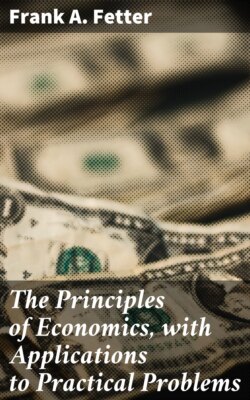Читать книгу The Principles of Economics, with Applications to Practical Problems - Frank A. Fetter - Страница 21
На сайте Литреса книга снята с продажи.
§ II. SOME IMPORTANT ECONOMIC CONCEPTS CONNECTED WITH WEALTH AND WELFARE
ОглавлениеPopular meaning of useful
1. Utility, in its broadest usage, is the general capability that things have of ministering to human well being. The term is evidently one without any scientific precision. It expresses only a general or average impression that we have in reference to the relation of a class of goods to human wants. Every one would agree to the statement that "water is useful," thinking of the fact that it is indispensable to life and that it ministers to life in a multitude of ways. But what of water in one's cellar, water soaking one's clothes on a cold day, water breaking through the walls of a mountain reservoir and carrying death and destruction in its path? The poison that is doing what we at the moment desire, we call useful; that doing what we would prevent, we call harmful. Noxious weeds become "useful" by the discovery of some new process by which they can be worked into other forms, though they may still continue to be noxious in many a farmer's fields. The utility of anything, therefore, is seen to be of a relative and limited nature. The term "utility" in popular speech is very inexact. It can be employed in economic discussion only when carefully modified and defined.
Kinds of goods
2. Goods consist of all those things objective to the user which have a beneficial relation to human wants. They fall into several classes. We may first distinguish between free and economic goods. Free goods are things that exist in superfluity, that is, in quantities sufficient not only to gratify, but to satisfy all the wants that may depend on them. Economic goods are things so limited in quantity that all of the wants to which they could minister are not satisfied. The whole thought of economy begins with scarcity; indeed, even the conception of free goods is hardly possible until some limitation of wants is experienced. Practical economics is the study of the best way to employ things to secure the highest amount of gratification. The problem itself arises out of the fact that many things are used up before all wants dependent on them are completely satisfied.
A distinction is often made between consumption and production goods, or it may be better to say immediate and intermediate goods. Consumption goods are those things which are immediately at the point of gratifying man's desires. Production goods are those things which are not yet ready to gratify desires; some of them, being merely means of securing consumption goods, never will themselves immediately gratify desire.
Value is utility given precision
3. Value, in the narrow personal sense, may be defined as the importance attributed to a good by a man. The vagueness and inexactness of the word "utility," or the word "good," disappears when we reach the word "value." It is not a usual relation or a vague degree of benefit sometimes present and sometimes absent, but it refers to a particular thing, person, time, and condition. Value is in the closest relation with wants, and in this narrow sense depends on the individual's estimate. From the meeting and comparison of the estimates of individuals, arise market values or prices, which are the central object of study in economics.
